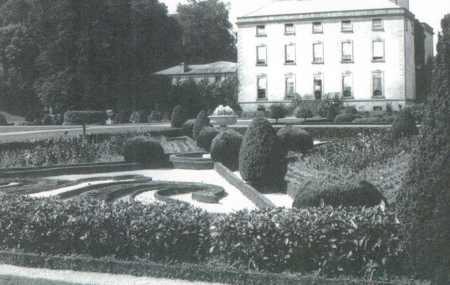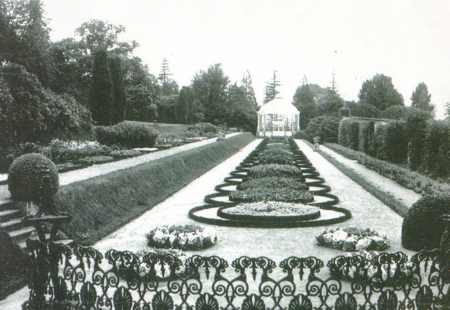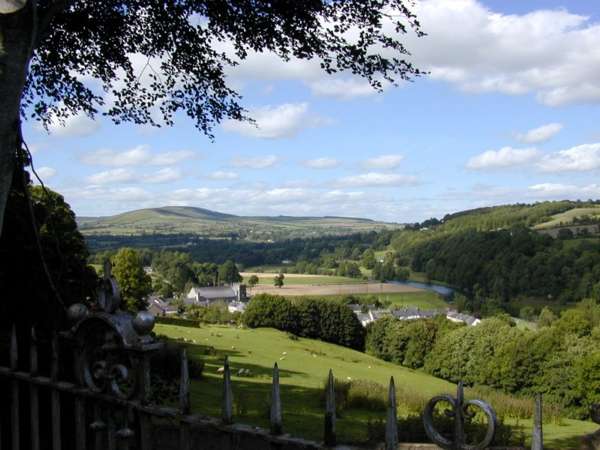
THE HANDSTAND
july 2005

INISTIOGE HISTORY CONTINUED
From Neil Fenton and
Billy Kirwan
A
transcription by Joe Heavener, a grandson of the
author,from the Notebook of Elsie A Heavener, who came
from England to work the Dairy Project for Mrs. Tighe of
the Woodstock Estate, Inistioge.It appears the Notebook
was written over several years - for instance reference
is made to being in Ireland for 60 years which would date
that part of the notes to 1966. It was finished in
1970.There were evidently newspaper cuttings to refer to
some parts of the story but they are gone missing.The
notebook was very small 2 inches by 3. It also contained
a few notes of her earlier life in England which have not
been included here.
1907AD.... I got the train for Thomastown , it seemed
a long journey, especially thro' the Bog of Allen. I saw
women cutting and piling little heaps of turf to dry.
poor women I thought. No men. These were the thoughts of
an English girl on her first visit to Ireland.
I was mey by Mrs Tighe, pony trap and groom. It was a nice 4 mile drive to Inistiogue, up the big hill to the Woodstock main gate and another mile up to the house.The family were all in London for 3 months in the Spring. I never heard how Mrs. Tighe heard of me except from the Dairy College. She never asked for a reference.
The House
The awful look of the long passage almost upset
me. There were only 3 laundry maids and 1 housemaid and
myself left on board, their Wages 10/-(shillings) per
week, mine 1£ per week and all found by ourselves.The
Dairy was a modern one and all over tiles and very
bright.The milk was carried up from the farm and poured
into large pans.... I churned every morning after
breakfast. Earlier I had to go down the farm to fetch
about 6 pints of milk for the nursery and dining room
breakfasts. The butter was weighed in Lbs, half Lbs and
ounces for various people in the house and any over was
sold at 1/- per pound. All accounts had to be kept every
day and the books I had to bring every week to Mrs. Tighe
to look over.. I had plenty to do (when the family came
home)in the Dairy. I often had sore feet going up and
down to the farm on most of the cobbles.
All the garden and
the demesne were very extensive and well laid out and
cared for. The lawns were cut with man, machine and
horse. I loved to hear it all day long.

The Family
Capt. and Mrs Tighe and the family: 4 little
girls; 1 boy; 2 Nursery staff;1 Ladysmaid;1 Butler;1
Housekeeper; 3 Housemaids; 3 Laundrymaids;2 Kitchenmaids;
1 Footman; 1 Man helper; 1 Governess (French). All lived
in the house. There were over 30 others(listed) working
in Stables. Gardening and Fishing and Forestry..There
were others I cannot remember.While the family were in
London and other places the butter was sent to them in
the Garden hamper of vegetables every week. The rest was
sold to the local people or the Army and Navy Stores in
London.
Sometimes, during the winter evenings, we were allowed a
little hop. The Melodian was well played and kept good
time. My special partner was lame Alec. He was very lame;
he must have been born lame, one leg was all short and
all bent up. He came smiling to ask me for a Barn Dance,
then off we started upperty bupperty and so on. I did not
enjoy it but I suppose he did. He worked in the garden.
Captain Tighe was Church of Ireland
and sat in the Gallery every Sunday when he was at
Woodstock. Mrs. Tighe was a Christian Scientist as were
her two Nursery maids and French Governess and the
children. We were invited to the service. I went once and
did not like it so did not go again to the Christian
Science meetings.
The heir Fritz died aged 7 or 8 yrs and was buried in
Inistioge church burial ground. That was a sad blow only
4 girls left. After a few years another son was born,
Bryan, and he grew to be a fine man. He joined the army
and Tank Co. Went to War II (1939-45) in Tanks and was
never seen, or found or heard of again.
War I (1914-1918)Captain Tighe
joined his late regiment for a while in London. He was
going to retire as he was not very well and suffered from
asthma, nor slept well. He was in a room alone. The maid
bringing tea heard moaning. They found him on the floor
and unconscious and blood-stained poker by his side.He
died a few days later and could not tell what happened.
For a long time the Police made enquiries. In the end a
woman found a gun-metal watch under her lodger's pillow
which Mrs. Tighe had given the Captain as a Christmas
present. DeStamir, a Frenchman, born in London, was
caught and later hung. He had been in the army, deserted,
been to Australia and other countries - a burglar in
every place he went. Captain Tighe was cremated and
remains brought for burial in Inistioge Churchyard.
Everybody was sad. A good man and thoughtful for all his
employees.
Time passed...
The Black
and Tans came to Woodstock empty house. They were there
for a long time. They told us not to go out at night. We
were living in Garden House nearby. the Black and Tans
were from England. They had rifles and a big gun they
shot off at 12PM across to over the river to Kilcross,
and they went about the country in lorries. They were
very friendly to us and wanted your Grandad to read some
Irish and ofcourse that was impossible. They went back to
England after a while.
The next who came to Woodstock House was the Free State.
Most things the same, fruit ande vegetables and eggs
going in hamper to Mrs.Tighe in London. After a while
they left.
Next came the Republican Forces, after them the fire
burned the house completely and gardens and grounds
became free for all. No-one knows who set the house on
fire. A complete job, only the Bachelors Gallery and also
the kitchen part were left untouched. After some time the
lands and park were sold to various people. We got the
sand-pit and land, a few acres. This we sold later for
£300. The Demesne all went to the Forestry Department.
the Bachelors Gallery and the kitchen wing were both let
to tenants. I never heard how much Mrs. Tighe got for all
the damage.
We lived at Garden House for some years. We had always
hoped to buy a farm and saved any shilling we could save
out of our wage of £2 per week, with house and coal.
Grandad was allowed to mark timber for sale owned by the
other gentlemen and that helped and what I had. In 1929
we heard of Rahaval Hall, Co.Wicklow for sale and bought
it. It cost us£1,050.00. We had to borrow the odd £50
so we were hard up. The farm was very neglected and weedy
so we all had to work hard and get settled in. The house
needed a lot of repairs and also farm buildings. We sold
the land at Inistioge for £300 that helped us a lot. We
settled in Rahaval Hall 118 acres and made it
comfortable.
Dec.1970 Hope this is readable and will be of interest
and the cuttings. So I'll finish now with many happy
thoughts of days gone by.
Your loving Grandma Elsie Agnes Heavener
Born 30December 1883. Died 1979
